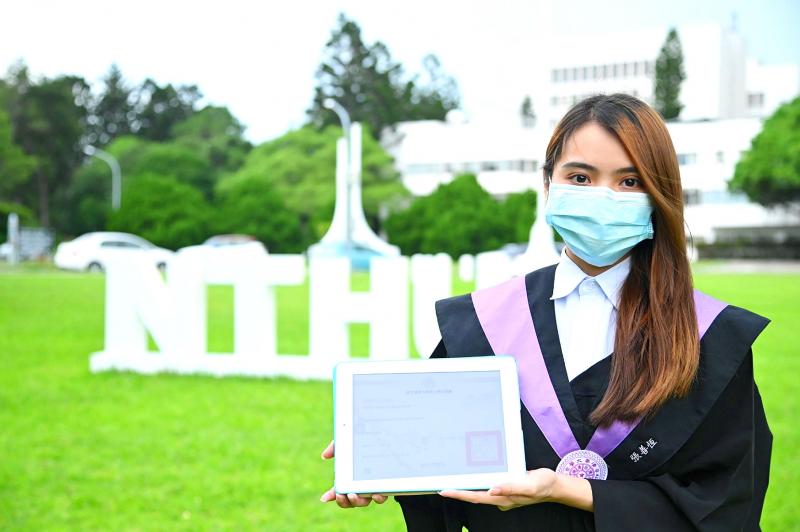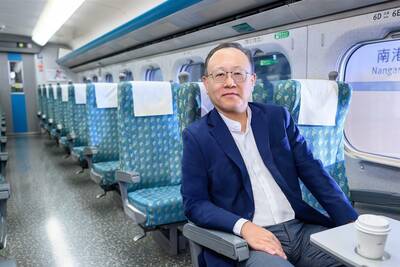National Tsing Hua University (NTHU) is to become the first higher-education institution in the nation to issue electronic diplomas with blockchain encryption, the Hsinchu-based university said yesterday.
Blockchains are to be used to encrypt the diplomas of students graduating next week, while academic records are to make use of the technology next year, NTHU said in a news release, adding that it is working with Taiwan-based tech company Turin Chain on the project.
Last year, the university’s graduates reported that many of the world’s top-tier graduate schools — including the University of Columbia — have stopped accepting hard-copy diplomas amid the pandemic, NTHU Office of Academic Affairs director Chiao Chuan-chin (焦傳金) said.

Photo courtesy of National Tsing Hua University
Moving student information to the digital realm is becoming a global standard and NTHU has found it necessary to adopt, he said.
Blockchain encrypted diplomas are permanent and can protect student privacy, prevent counterfeiting and tampering, and can be easily shared, including on digital platforms such as LinkedIn, Chiao said.
Starting on Monday next week, NTHU’s 5,000 graduate students may apply for a blockchain-based diploma for free and expect to receive it within three work days, he said,.
The electronic documents will be available in English and Chinese, he added.
Alumni who enrolled on Aug. 1, 1986, or later may also apply for blockchain-based diplomas, Chiao said.
Paper-based diplomas will continue to be issued, albeit “their usefulness in the future is likely to be diminished into wall decorations,” he said.
Blockchains use cryptology and distributed algorithmic calculations to achieve decentralization, Turin Chain cofounder and chief executive Jeff Hu (胡耀傑) said.
“Information, once coded, becomes unchangeable even to the department that authored it.” he said.
“This means trust is absolute,” he said.
Students with blockchain-based diplomas may supply a QR code or a link to prospective schools or employers, who would then be able to access relevant and authenticated certificates, he said.
Hu had first-hand experience of applying for schools in the US as an international student holding a degree in Hong Kong, he said.
He said that it was such a bother, but it inspired him to look for partners to work on blockchain-based diplomas, a technology already in use by the Massachusetts Institute of Technology.
Turin Chain’s blockchain has been utilized at the University of California, Berkeley’s School of Law since 2019, he said.
Many members of the Turin Chain team are NTHU alumni, and the firm has allowed the school to use its technology as a donation, he said.
“I worry that paper diplomas could be damaged or lost, but I can save the electronic copy on [my] phone and send it to employers anywhere or to my parents,” said Chang Shan-heng (張善恆), a Malaysian student who graduated from NTHU this month.
“It is also advantageous that this diploma is acceptable to employers in Malaysia,” she added.

The inspection equipment and data transmission system for new robotic dogs that Taipei is planning to use for sidewalk patrols were developed by a Taiwanese company, the city’s New Construction Office said today, dismissing concerns that the China-made robots could pose a security risk. The city is bringing in smart robotic dogs to help with sidewalk inspections, Taipei Deputy Mayor Lee Ssu-chuan (李四川) said on Facebook. Equipped with a panoramic surveillance system, the robots would be able to automatically flag problems and easily navigate narrow sidewalks, making inspections faster and more accurate, Lee said. By collecting more accurate data, they would help Taipei

STATS: Taiwan’s average life expectancy of 80.77 years was lower than that of Japan, Singapore and South Korea, but higher than in China, Malaysia and Indonesia Taiwan’s average life expectancy last year increased to 80.77 years, but was still not back to its pre-COVID-19 pandemic peak of 81.32 years in 2020, the Ministry of the Interior said yesterday. The average life expectancy last year increased the 0.54 years from 2023, the ministry said in a statement. For men and women, the average life expectancy last year was 77.42 years and 84.30 years respectively, up 0.48 years and 0.56 years from the previous year. Taiwan’s average life expectancy peaked at 81.32 years in 2020, as the nation was relatively unaffected by the pandemic that year. The metric

TAKING STOCK: The USMC is rebuilding a once-abandoned airfield in Palau to support large-scale ground operations as China’s missile range grows, Naval News reported The US Marine Corps (USMC) is considering new sites for stockpiling equipment in the West Pacific to harden military supply chains and enhance mobility across the Indo-Pacific region, US-based Naval News reported on Saturday. The proposed sites in Palau — one of Taiwan’s diplomatic allies — and Australia would enable a “rapid standup of stored equipment within a year” of the program’s approval, the report said, citing documents published by the USMC last month. In Palau, the service is rebuilding a formerly abandoned World War II-era airfield and establishing ancillary structures to support large-scale ground operations “as China’s missile range and magazine

Passengers on Taiwan High Speed Rail (THSR) will be required to use headphones and make phone calls in gangways under new “quiet travel” rules starting Sept. 22. THSR Chairman Shih Che (史哲) told media that THSR will run a three-month promotional campaign to ensure widespread adoption of the new rules. Those repeatedly ignoring the guidance face the potential termination of their transport contract, which can result in them getting escorted off the train, according to THSR. Shih shared his hope to cultivate an environment conducive to rest and reading for the train’s passengers, stating that these changes aim to “promote self-discipline” among passengers